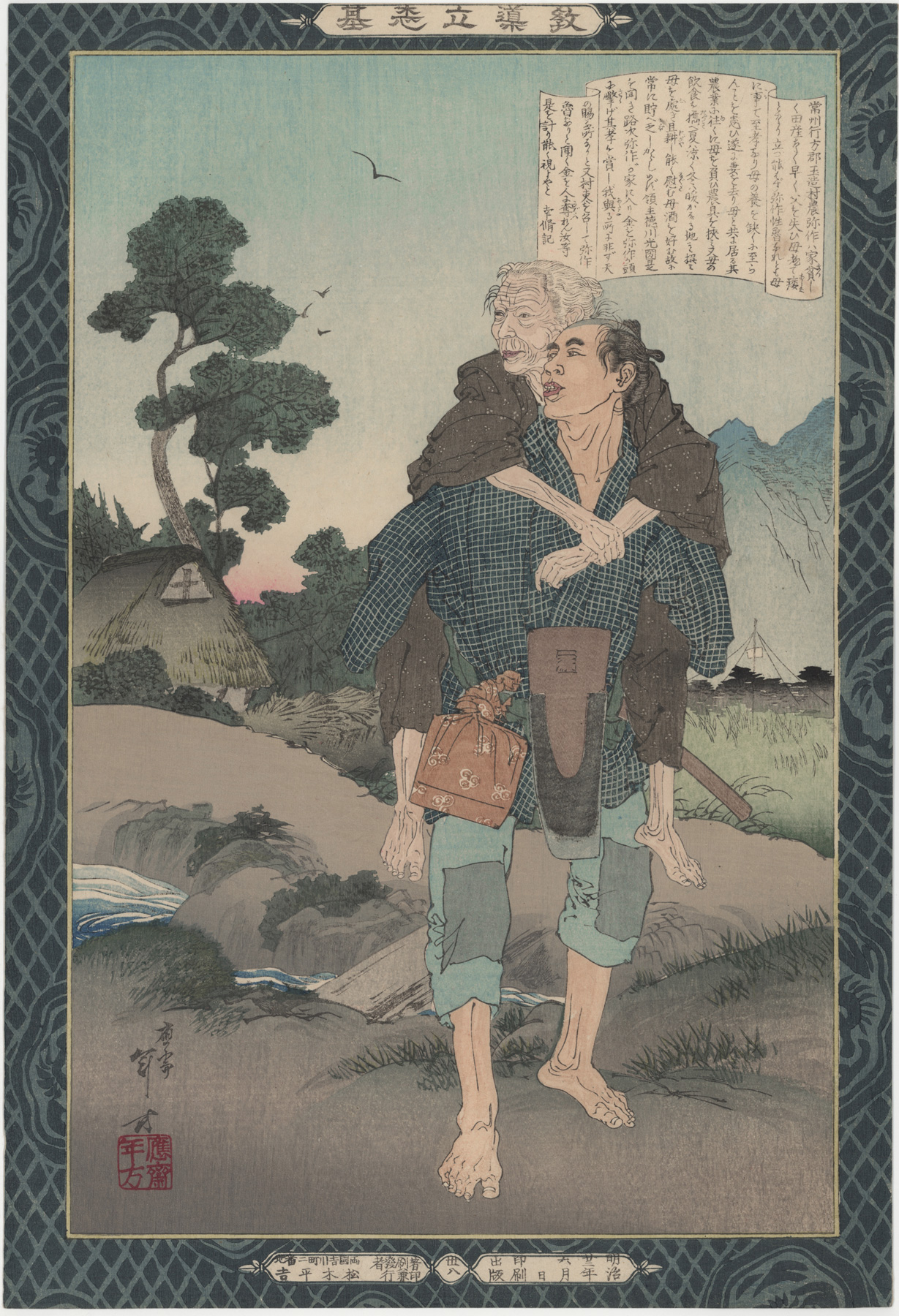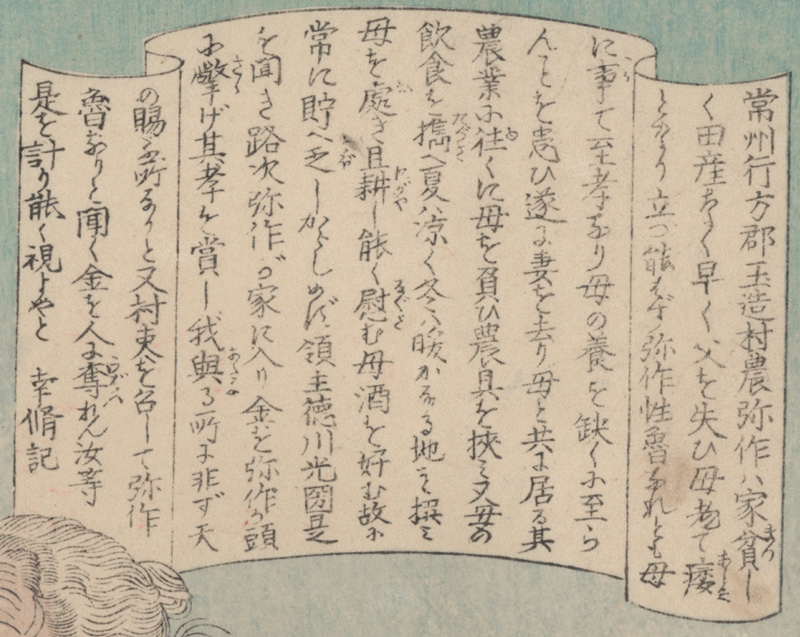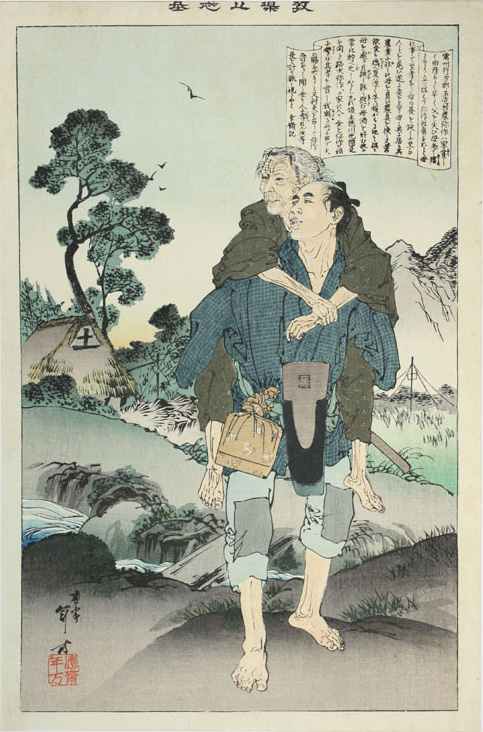About This Print
Print number 卅八 (38)1 in the series Instructive Models of Lofty Ambition picturing the farmer Yasaku carrying his mother on his back. Yasaku received a prize from his lord, the daimyo of Mito Tokugawa Mitsukuni 徳川光圀 (1628-1700), because of his deep filial piety to his mother. Tokugawa Mitsukuni was seen as a benevolent ruler and had a deep respect for the farme. It is said that he "kept a small figure of a farmer with him to remind him to be grateful to the hardworking rural population for every meal he ate."2Toshikata contributed 16 prints to this series.
1 Numbering of the prints was haphazard during the production of the series. Print numbers were sometimes inadvertently omitted; some prints in the series were never assigned numbers and a few of the same numbers appear on different prints.
2 A Time of Crisis: Japan, The Great Depression, and Rural Revitalization, Kerry Smith, Harvard Univ. Asia Center, 2001, p. 188.Transcription of Scroll
A scroll, present on each print in the series, contains brief historical details of the figure and scene being portrayed.
38 Farmer named Yasaku 農弥作
教導立志基 三十八 農弥作 水野年方 1889年6月
Transcription:
“常州行方郡玉造村農弥作ハ家貧しく田産少なし?早く父を失ひ母老て痿(あしなへ)となり立つ能わず 弥作性魯なれども母に事(つかへ)て至孝なり 母の養を缺(欠)くに至らんことを患ひ遂に妻を去り母と共に居る 其農業に往くに母を負ひ農具を挟ミ又母の飲食を携へ夏ハ涼く冬ハ暖かなる地を撰ミ母を處き且耕し能く慰む 母酒を好む故に常に貯へ乏しからしめず 領主徳川光圀是を聞き路次弥作が家に入り金を弥作が頭に?げ其孝を賞し 我與る所に非ず天の賜る所なり と 又村吏を召して弥作魯なりを聞て 金を人に奪れん 汝等是を計り能く視よや と 幸脩 記”
Later Reissue with Changed Border
1902 reissue
About The Series "Kyōdō risshi no motoi"
Notes:1. This series is variously translated as "Instructive Models of Lofty Ambition," "Foundations of Learning and Achievement," "Foundation of Instruction and Perseverance," "Self-Made Men Worthy of Emulation," "Paragons of Instruction and Success," "Moral of Success," "Examples of Self-Made Leaders," and "Instruction in the Fundamentals of Success." The title in Japanese is sometimes seen as "Kyōdō risshiki or "Kyōdō risshi no moto," in addition to the most commonly seen transliteration of "Kyōdō risshi no motoi".2. For a complete listing of all the prints in the series and additional information please see the article on this site titled Instructive Models of Lofty Ambition.
This series ran between October 1885 and November 1890 and featured a long list of heroes and heroines, from antiquity to contemporary times, who were regarded as standards of moral leadership and self-realization.
Source: Kiyochika Artist of Meiji Japan, Henry D. Smith II, Santa Barbara Museum of Art, 1988, p. 74-75; original research and as footnoted.
This series of 58 prints,1 plus a table of contents sheet (目録), were originally published between October 1885 and November 1890 by the Tokyo publisher Matsuki Heikichi 松木平吉.2 The table of contents sheet issued by the publisher states that "fifty prints make up the complete set (五十番揃)". Three prints not in the initial release were added over the five year publication period, as were five redesigns of original prints, eventually increasing the total print count to 58. The seven artists contributing prints were Kobayashi Kiyochika (1847-1915) [20 prints], Mizuno Toshikata (1866-1908) [16 prints], Inoue Tankei (Yasuji) (1864-1889) [13 prints], Taiso (Tsukioka) Yoshitoshi (1839-1892) [5 prints], Yōshū Chikanobu (1838-1912) [2 prints], Toyohara Kunichika (1835–1900) [1 print], and Hachisuka (Utagawa) Kuniaki II (1835-1888) [1 print]. All the artists, with the exception of Yōshū Chikanobu, are listed in the top scroll of the table of contents sheet. Various colors (including blue, blue/green, and tan/brown) were used for the decorative border, and in 1902 the series was re-issued by Matsuki without borders.
Brief texts contained within a scroll-like cartouche appearing on each print provide historical details. The scroll composer's name is given at the end of the scroll text. The “lofty ambition” of the title is a Confucian concept, originally from Mencius, meaning “righteous determination that would inspire others.” The market for the series probably included former samurai, ambitious youth, and conservative intellectuals.
"[W]hen it was completed in 1890 the publisher was singled out for special recognition by the government for having sponsored such noble subject matter."3
This series ran between October 1885 and November 1890 and featured a long list of heroes and heroines, from antiquity to contemporary times, who were regarded as standards of moral leadership and self-realization.
Source: Kiyochika Artist of Meiji Japan, Henry D. Smith II, Santa Barbara Museum of Art, 1988, p. 74-75; original research and as footnoted.
This series of 58 prints,1 plus a table of contents sheet (目録), were originally published between October 1885 and November 1890 by the Tokyo publisher Matsuki Heikichi 松木平吉.2 The table of contents sheet issued by the publisher states that "fifty prints make up the complete set (五十番揃)". Three prints not in the initial release were added over the five year publication period, as were five redesigns of original prints, eventually increasing the total print count to 58. The seven artists contributing prints were Kobayashi Kiyochika (1847-1915) [20 prints], Mizuno Toshikata (1866-1908) [16 prints], Inoue Tankei (Yasuji) (1864-1889) [13 prints], Taiso (Tsukioka) Yoshitoshi (1839-1892) [5 prints], Yōshū Chikanobu (1838-1912) [2 prints], Toyohara Kunichika (1835–1900) [1 print], and Hachisuka (Utagawa) Kuniaki II (1835-1888) [1 print]. All the artists, with the exception of Yōshū Chikanobu, are listed in the top scroll of the table of contents sheet. Various colors (including blue, blue/green, and tan/brown) were used for the decorative border, and in 1902 the series was re-issued by Matsuki without borders.
This series of 58 prints,1 plus a table of contents sheet (目録), were originally published between October 1885 and November 1890 by the Tokyo publisher Matsuki Heikichi 松木平吉.2 The table of contents sheet issued by the publisher states that "fifty prints make up the complete set (五十番揃)". Three prints not in the initial release were added over the five year publication period, as were five redesigns of original prints, eventually increasing the total print count to 58. The seven artists contributing prints were Kobayashi Kiyochika (1847-1915) [20 prints], Mizuno Toshikata (1866-1908) [16 prints], Inoue Tankei (Yasuji) (1864-1889) [13 prints], Taiso (Tsukioka) Yoshitoshi (1839-1892) [5 prints], Yōshū Chikanobu (1838-1912) [2 prints], Toyohara Kunichika (1835–1900) [1 print], and Hachisuka (Utagawa) Kuniaki II (1835-1888) [1 print]. All the artists, with the exception of Yōshū Chikanobu, are listed in the top scroll of the table of contents sheet. Various colors (including blue, blue/green, and tan/brown) were used for the decorative border, and in 1902 the series was re-issued by Matsuki without borders.
Brief texts contained within a scroll-like cartouche appearing on each print provide historical details. The scroll composer's name is given at the end of the scroll text. The “lofty ambition” of the title is a Confucian concept, originally from Mencius, meaning “righteous determination that would inspire others.” The market for the series probably included former samurai, ambitious youth, and conservative intellectuals.
"[W]hen it was completed in 1890 the publisher was singled out for special recognition by the government for having sponsored such noble subject matter."3
1 The Tokyo Metropolitan Library online collection shows 50 prints and a Table of Contents sheet. The Table of Contents lists the titles of 50 prints. Smith in Kiyochika Artist of Meiji Japan identified 52 prints. I have identified 58 prints from this series including five prints (Ikina, Michizane Sugiwara, Kesa Gozen, Soga Brothers and Hokiichi Hanawa) that were re-designed and re-printed, likely due to damaged or lost blocks.
2 Robert Schaap notes in Appendix II, p. 166 of Yoshitoshi, Masterpieces from the Ed Freis Collection, Chris Uhlenbeck and Amy Reigle Newland, Hotei Publishing, 2011 that the series originally appeared as newspaper supplements.
3 The World of the Meiji Print: Impressions of a New Civilization, Julia Meech-Pekarik, Weatherhill, 1986, p. 122.
1 The Tokyo Metropolitan Library online collection shows 50 prints and a Table of Contents sheet. The Table of Contents lists the titles of 50 prints. Smith in Kiyochika Artist of Meiji Japan identified 52 prints. I have identified 58 prints from this series including five prints (Ikina, Michizane Sugiwara, Kesa Gozen, Soga Brothers and Hokiichi Hanawa) that were re-designed and re-printed, likely due to damaged or lost blocks.
2 Robert Schaap notes in Appendix II, p. 166 of Yoshitoshi, Masterpieces from the Ed Freis Collection, Chris Uhlenbeck and Amy Reigle Newland, Hotei Publishing, 2011 that the series originally appeared as newspaper supplements.
3 The World of the Meiji Print: Impressions of a New Civilization, Julia Meech-Pekarik, Weatherhill, 1986, p. 122.
Print Details
| IHL Catalog | #478 |
| Title or Description | Yasaku, A Dutiful Son 農弥作 |
| Series | “Instructive Models of Lofty Ambition” (Kyodo risshiki 教導立志基) [note: seriestitle also listed as 'Kyodo Risshi no Moto', ‘Kyodo risshi no motoi’,‘Kyōdō risshi ki’ and variously translated as “Moral of success” or“Foundations of learning and achievement” or “Self-made Men Worthy ofEmulation”' or “Examples of Self-made Leaders” or "Paragons of instruction and success"] |
| Artist | Mizuno Toshikata (1866-1908) |
| Signature |  |
| Seal | Ōsai Toshikata 応斎年方 seal as shown above below signature |
| Publication Date | June 1889 明治廿二年 六 |
| Publisher | Matsuki Heikichi (松木平吉) proprietor of Daikokuya Heikichi [Marks: seal not shown; pub. ref. 029] click to enlarge (from right to left) publishing and printing date: 明治廿二年 六月 日 印刷 出版 [notification delivered, Meiji 22 6th month] assigned number within series: 卅八 [38] publisher information: 著刷發者 両国吉川町二番地 印兼行 松木平吉 [publisher and printer Ryōgoku Yoshikawachō 2-banchi Matsuki Heikichi] |
| Impression | excellent |
| Colors | excellent |
| Condition | good - Japanese album backing paper; very minor marks and flaws; borders slightly trimmed |
| Genre | ukiyo-e; rishki-e; kyōiku nishiki-e |
| Miscellaneous | print number 38 (卅八); position 38 in the Table of Contents for the series |
| Format | vertical oban |
| H x W Paper | 13 7/8 x 9 3/8 in. (35.2 x 23.8 cm) |
| Literature | |
| Collections This Print | Tokyo Metropolitan Library 280-K2 |




